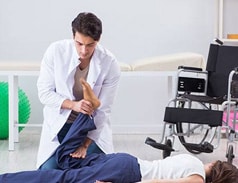I’m Parnashree from Miami and Lakelands Physio and I’m going to explain what exactly is frozen shoulder, and the best way of treating it.
What is frozen shoulder?
Frozen shoulder or frozen shoulder contracture syndrome is a gradually progressing condition. It is often a 2 to 3 stage process.
The first stage is called the freezing stage, where pain predominates and there is developing stiffness. This can last for up to 9 months.
Second stage is called the frozen stage where there is more stiffness in the shoulder than pain which can last up to 12 months. At the end of the two phases, the capsule contracts, there is reduction in joint volume, increased number of cells and fibrosis of certain ligaments.
The third stage is the recovery phase where function generally returns and this can last up to 24 months. On an average, the condition lasts for nearly 3 years or more. But studies have shown that the majority of the people experience persistent symptoms and shoulder movement restriction even after the natural course of the condition.
Why does this happen? Why me?
Well, it can affect anyone and the cause for primary frozen shoulder is unknown. It typically affects people between 45 to 55 age-group and risk increases with diabetes, certain hormonal imbalances, hypothyroidism, people with a background of cardiovascular disease or history of cervical pain.
Secondary frozen shoulder can be as a result of several predisposing factors such as fractures, post-surgery, post shoulder injuries such as rotator cuff pathologies, shoulder calcific tendinopathies and more.
When can physio help?
Physiotherapy can help in early diagnosis, management and help in faster recovery. So if you are someone who is developing shoulder stiffness, experiencing pain and not sleeping well, visit us at Lakelands and Miami Physiotherapy for an accurate diagnosis.
Night pain is the most common symptom in the first stage of frozen shoulder. Not getting enough sleep increases the pain sensitivity and affects tissue health and healing. We will discuss all the treatment options available for frozen shoulder and refer you for scans when needed.
There is increasing evidence and support for ultrasound guided intra-articular cortisone injections in the early stage, which can actually stop the fibrosis and contraction of the capsule in the second stage. This has the potential to reduce symptoms. Although, there are risks and benefits associated with it which you can discuss with us or your GP. Continued physiotherapy in the second stage involves improvement in pain and movement with various individualised exercises, stretches and mobilisation techniques.
With early, effective and continued evidence-based physiotherapy treatment at our clinic, we can help you recover faster and reduce your pain experience.

